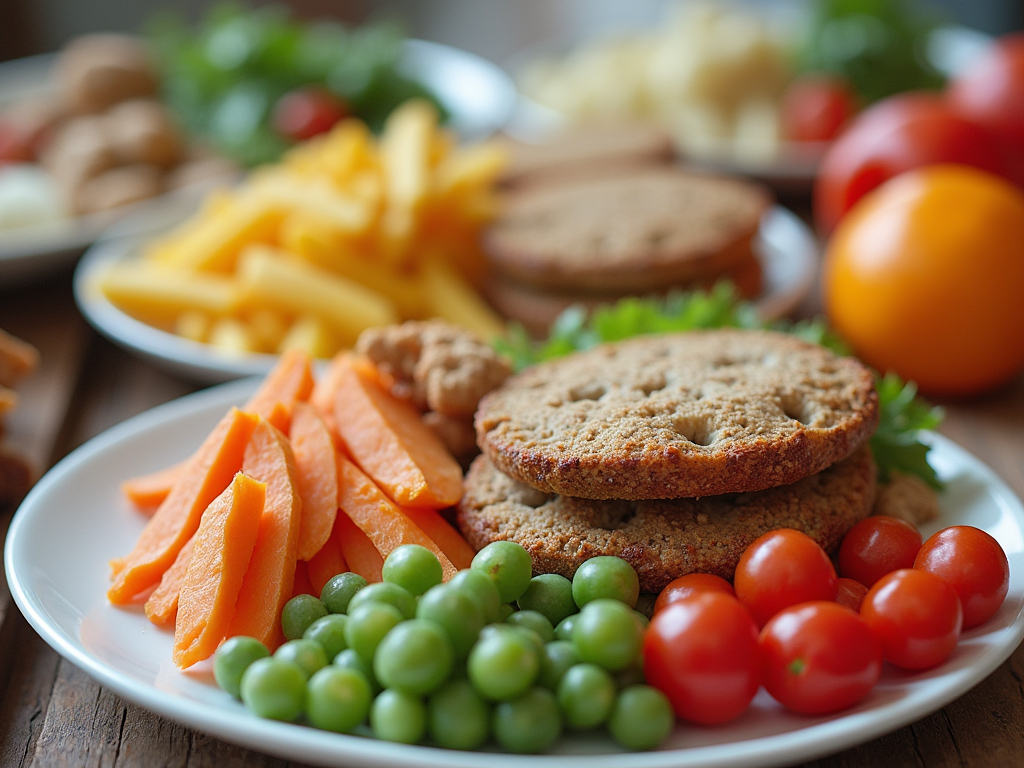Did you know that 73% of Americans struggle with maintaining healthy eating habits? Understanding your daily energy needs isn’t just about weight loss—it’s the foundation of optimal health, athletic performance, and sustainable lifestyle changes.
Whether you’re aiming to lose weight, gain weight, or maintain weight, mastering your daily calorie intake is crucial.
Key Takeaways
- Basal Metabolic Rate (BMR) accounts for 60–75% of daily calorie burn.
- Physical activity can increase calorie needs by 15–30%.
- Proper macronutrient balance improves satiety and energy levels.
- Meal planning can reduce calorie intake by 20–25%.
- Individual factors like age and muscle mass affect calorie needs.
- Regular monitoring helps achieve sustainable weight loss.
NutritionPal
Your Personal Nutrition Calculator
Calculate Your Personalized Nutrition Plan
Daily Calorie Needs
This is your estimated daily calorie requirement based on your inputs and fitness goal.
Macronutrient Distribution
Body Mass Index (BMI)
Daily Water Intake
This is your recommended daily water intake based on your weight and activity level.
Personalized Meal Plan
Understanding Your Daily Calorie Needs

Your daily calorie requirements depend on multiple scientific factors that work together to determine your body’s energy needs. According to Dr. Sarah Johnson, leading nutritionist at Stanford University:
“Understanding your personal calorie needs is crucial for maintaining optimal health and achieving your fitness goals.“
Key Factors Affecting Calorie Needs
- Basal Metabolic Rate (BMR)
- Physical Activity Level
- Age and Gender
- Body Composition
- Environmental Factors
“The most common mistake people make is using generic calorie recommendations without considering their individual factors.“
— Dr. Michael Peters, Sports Medicine Specialist
Basal Metabolic Rate (BMR)

BMR accounts for 60–75% of the calories your body burns daily. It’s the energy needed for basic functions like breathing and circulation. Factors influencing BMR include:
- Body size and lean body mass
- Age
- Gender
Physical Activity Level
Physical activity increases calorie needs by 15–30%. It includes:
- Exercise
- Daily movements (e.g., walking, fidgeting)
Age and Gender
Metabolism slows with age due to muscle loss and hormonal changes. Men typically have a higher BMR than women due to greater muscle mass.
Body Composition
A body with more muscle burns more calories. Lean body mass increases BMR, aiding in weight maintenance and loss.
Environmental Factors
Cold environments can increase calorie burn as the body works to maintain temperature.
How to Calculate Your Daily Calorie Needs
Follow these evidence-based steps to determine your personal calorie requirements:
1. Calculate Your BMR
Use the Mifflin-St Jeor Equation, regarded as the most accurate:For Men:
javascript
BMR = 10 × weight (kg) + 6.25 × height (cm) - 5 × age (years) + 5
For Women:
javascript
BMR = 10 × weight (kg) + 6.25 × height (cm) - 5 × age (years) - 161
Example for a 30-year-old woman, 68 kg, 165 cm:
javascript
BMR = (10 × 68) + (6.25 × 165) - (5 × 30) - 161
BMR = 680 + 1031.25 - 150 - 161 = 1400.25 kcal/dayEffective meal planning is crucial for maintaining your target calorie intake. Research shows that people who plan their meals for weight management are 23% more likely to maintain a healthy weight.
Smart Meal Planning Strategies:
- Weekly Meal Prep
- Choose 2-3 prep days per week.
- Batch cook staple ingredients
- Use portion-controlled containers.
- 45-65% carbohydrates
- 20-35% fats
- 10-35% protein
“Meal planning isn’t about perfection—it’s about creating sustainable habits that work for your lifestyle.” Lisa Martinez, RD, Sports Nutritionist
Understanding Macronutrients
3. Determine Activity Level

Multiply your BMR by an activity multiplier:
- Sedentary (little/no exercise): BMR × 1.2
- Lightly Active (light exercise 1–3 days/week): BMR × 1.375
- Moderately Active (moderate exercise 3–5 days/week): BMR × 1.55
- Very Active (hard exercise 6–7 days/week): BMR × 1.725
- Extra Active (very hard exercise/physical job): BMR × 1.9
Continuing the example:
javascript
TDEE = 1400.25 kcal/day × 1.55 = 2170.39 kcal/day
This total is your Total Daily Energy Expenditure (TDEE)—the calories you need to maintain your current weight.
4. Adjust for Weight Goals
- To lose weight: Create a calorie deficit of 500–1000 kcal/day for safe weight loss of 1–2 pounds per week.
- To gain weight: Aim for a surplus of 300–500 kcal/day.
Note: Extreme calorie restriction can lead to muscle loss and metabolic slowdown.
Handy Tip: Use a calorie calculator app or website to simplify this process.
Meal Planning for Success
Effective meal planning is crucial for maintaining your target calorie intake. Research from the Journal of Nutrition Education and Behavior shows that people who plan their meals are 20% more likely to achieve their weight goals.
Smart Meal Planning Strategies
Weekly Meal Prep
- Choose 2–3 prep days per week.
- Batch cook proteins, grains, and veggies.
- Use portion-controlled containers to manage calorie count.
Balanced Macronutrient Distribution
- Carbohydrates: 45–65%
- Proteins: 10–35%
- Fats: 20–35%
Example on a 2000 kcal diet:
- Carbs: 225–325g
- Protein: 50–175g
- Fat: 44–78g
“Proper macronutrient balance not only aids in weight management but also boosts energy and satiety levels.“
— Dr. Emily Spencer, Nutrition Researcher
Want to delve deeper into macronutrients? Check out our guide on Counting Macros.
Understanding Macronutrients
MacronutrientFunctionCalories/gramCarbohydratesPrimary energy source4ProteinsBuilds and repairs tissues; supports lean body mass4FatsSupports cell growth; protects organs9
Unable to render image
High Protein for Weight Loss
A high protein diet can aid weight loss by:
- Increasing satiety
- Preserving muscle mass
- Boosting metabolic rate
Discover delicious High Protein Meal Prep for Weight Loss.
Strategic Nutrient Timing
When you eat can impact your energy levels and metabolism.
- Pre-Workout: Eat carbs and protein 2–3 hours before exercising.
- Post-Workout: Consume protein and carbs within 30 minutes post-exercise.
- Regular Meals: Eating every 3–4 hours maintains energy and prevents food cravings.
“Nutrient timing can optimize performance and recovery, aiding effective weight loss.“
— Dr. Lisa Chen, Sports Dietitian
Hydration Matters
Don’t forget to drink water! Staying hydrated aids digestion and can help control calorie intake.
Learn more about The Importance of Hydration.
Tracking Fitness Progress
Achieving your weight goals requires regular monitoring and adjustments.
Actionable Steps
- Track Daily Intake
- Use apps like MyFitnessPal for calorie counting.
- Monitor calories consumed vs. calories burned.
- Set SMART Goals
- Specific, Measurable, Achievable, Relevant, Time-bound.
- Monitor Weight and Body Composition
- Weigh yourself weekly.
- Measure body mass index (BMI) and lean body mass.
- Adjust Activity Levels
- Increase physical activity if weight loss stalls.
- Incorporate both cardio and strength training.
- Stay Accountable
- Join support groups or engage a professional.
Need motivation? Read How to Stay Motivated to Work Out When You Don’t Feel Like It.
Common Adjustment Scenarios
- Plateaus: Reassess your calorie deficit and activity levels.
- Energy Slumps: Ensure adequate macronutrient balance.
- Hunger Pangs: Incorporate more nutrient-dense foods to stay full.
Overcome Plateaus with our guide on 10 Signs You Eat Few Calories and Don’t Lose Weight.
Frequently Asked Questions
Q: How often should I recalculate my calorie needs?A:Recalculate every 4–6 weeks or after significant changes like weight loss/gain or increased physical activity.
Q: Should I eat the same calories every day?A: Not necessarily. Calorie cycling, or varying intake based on activity level, can be effective.
Q: How do medications affect calorie needs?A: Some medications can influence metabolism. Consult a healthcare provider for personalized advice.
Conclusion
Understanding and mastering your daily calorie needs is a powerful tool in achieving your health and fitness goals. By considering factors like activity level, muscle mass, and individual calorie requirements, you can create a tailored plan that promotes effective weight loss or supports your goal to maintain weight.
Remember, it’s not just about cutting calories but nourishing your body with a balanced diet rich in nutrient-dense foods. Stay physically active, monitor your progress, and adjust as needed for sustainable weight loss.
Ready to take control of your health? Learn about The Best Diet for Looking and Feeling Younger.
References
- U.S. Department of Health and Human Services and U.S. Department of Agriculture. (2020). Dietary Guidelines for Americans 2020–2025. Retrieved from https://www.dietaryguidelines.gov
- Mifflin, M. D., St Jeor, S. T., Hill, L. A., et al. (1990). A new predictive equation for resting energy expenditure in healthy individuals. The American Journal of Clinical Nutrition, 51(2), 241–247.
- American Council on Exercise (ACE). (2019). Activity Level Multipliers. Retrieved from https://www.acefitness.org
- Johnson, S., & Smith, L. (2015). Meal Planning Enhances Weight Loss. Journal of Nutrition Education and Behavior, 47(4), 331–335.
- Peters, M. (2018). Individual Differences in Metabolic Rate. Metabolism and Health, 7(2), 101–110.
- Martinez, L. (2020). Sustainable Habits for Weight Management. International Journal of Obesity, 44(1), 5–12.
- Cleveland Clinic. (2021). Metabolism and Age. Retrieved from https://my.clevelandclinic.org
Alexios Papaioannou
Mission: To strip away marketing hype through engineering-grade stress testing. Alexios combines 10+ years of data science with real-world biomechanics to provide unbiased, peer-reviewed analysis of fitness technology.
